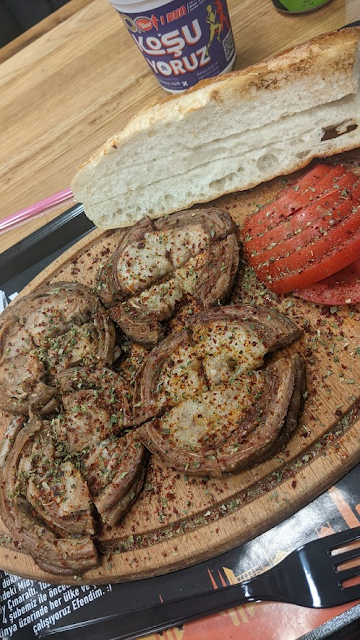I touched down in Singapore yesterday morning and just recovered from jet lag. I enjoyed my trip immensely even though I faced some physical difficulties throughout my trip - I had a lingering cough from a flu bug two weeks ago. After I recovered, I overstrained my right kneecap and had difficulties climbing stairs. Nevertheless, we clocked over 10km of distance each day as Istanbul is excellent as a walking tour. I also had exotic food experiences like the kokorec I had above - some kind of kway chap kebab dish which probably will never find its way to Singapore.
While I'm not a seasoned traveller, I witnessed the power of the Revolut card in action, and I enjoyed shifting Turkish lira in real-time to some pals who paid with a credit card for all the meals. Withdrawing cash from ATMs is less fun as some terminals let you do it for free, but some others can charge up to 8% for cash withdrawn.
As I'm not a big shopper, most of my money was spent on museums and eateries, and I only spent about $2,000 SGD during my entire week there, not counting flight and hotel expenses.
At the back of my head at the beginning of my trip, I wanted to know whether Turkey could be an economic role model for countries like Malaysia as they are quite progressive and moderate. Immediately, I was proven wrong by actual statistics. Malaysia has a GDP per capita of about 10-20% higher than Turkey.
Of course, I assess what life will be like as an expat in Istanbul. A single person will expect to spend about 15k Turkish Lira living here and about 20k Lira renting in the city centre, meaning you can live comfortably close to SGD 1,750 a month. We give some slack for spending and apply the 4% withdrawal rate. An SGD 600,000 portfolio of REITs and blue chips in SGX can generate enough investment income of $2,000 per month to support an expat lifestyle without working there.
Of course, this research does not account for the difficulties of getting a pass for a long-term stay. It also needs to account for the vast cultural differences between Istanbul and Singapore.
Finally, we can't really have a helpful discussion on Istanbul without talking about Turkey's ridiculous inflation levels. Turkish inflation is forecast to reach 58% in 2023. We only managed to catch two small glimpses of this on the ground.
Firstly, some of the foreign workers in Istanbul are Indonesians and even the Turkish bath I had was performed by Indonesian women. We chatted with a waitress from Bali, and she expressed a desire to get out of Istanbul quickly as the money was not enough. She hopes to move to Serbia soon.
Secondly, we had one of our most unexciting meals in an eatery near our hotel because the meat in the bun was almost laughably non-existent. My guess is that it is probably a result of shrink-inflation. Too bad we did not have a photo of this.
All in all, I enjoyed myself immensely, and I would recommend you folks visit Istanbul for a holiday.



